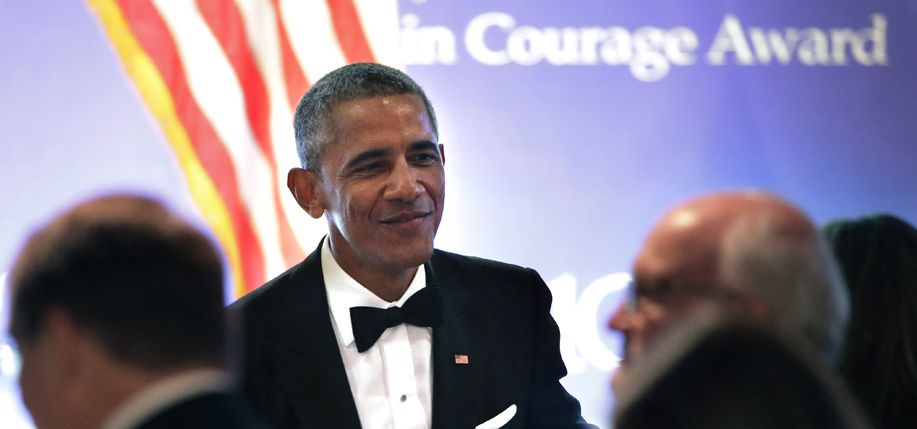In May, former president Barack Obama received the John Fitzgerald Kennedy Profile in Courage Award at the JFK Library in Boston. The award, which was created in 1990, is given each year in recognition of outstanding public service.
The award is named after Kennedy’s 1957 book Profiles in Courage, which documented the congressional careers of eight U.S. Senators who had voted on unpopular bills, against the wishes of their constituents, because they believed the measures were morally right. Obama touched on this legacy in his acceptance speech, his first public remarks since the U.S. House of Representatives passed the American Health Care Act, which, if made law, would reverse much of Obama’s Affordable Care Act.
Speaking of the members of congress who helped pass the ACA in 2010, Obama said, “They did the hard thing. Theirs was a profile in courage. Because of that vote, 20 million people got health insurance who didn’t have it before.
“And most of them did lose their seats, but they were true to what President Kennedy defined in his book as a congressional profile in courage: the desire to maintain a reputation for integrity that is stronger than the desire to maintain office.”
He also offered a warning to the current Senate, which will vote on the AHCA in the coming months: “I hope that current members of Congress recall that it actually doesn’t take a lot of courage to aid those who are already powerful, already comfortable, already influential. But it does require some courage to champion the vulnerable and the sick and the infirm, those who often have no access to the corridors of power.
“I hope they understand that courage means not simply doing what is politically expedient but doing what they believe deep in their hearts is right.”
In April, Obama made his first public appearance since leaving office at the University of Chicago, where he discussed the similarities between treatment of today’s immigrants and Irish fleeing the Great Hunger. “The truth is the history of our immigration system has always been a little bit haphazard, a little bit loose, a little bit determined by [the question of] did the country want more workers, economic imperatives; sometimes it was driven by biases,” he said.
“If you look at what was said about [the] Irish when they were coming here in the wake of the potato famine, they talked about them the same way you hear people talking about immigrants today. This is an example of where everybody being able to see the realities of immigrants as people – not as some ‘other’ – is important.”
John F. Kennedy’s own ancestors were part of this immigration. His maternal Fitzgerald great-grandparents emigrated from County Limerick and his paternal Kennedy great-grandparents emigrated from County Wexford during the famine, both eventually settling in Boston. ♦
Obama Receives JFK Profile in Courage Award


Leave a Reply